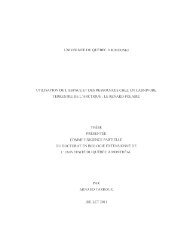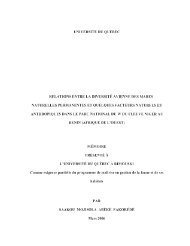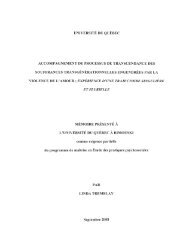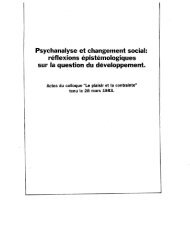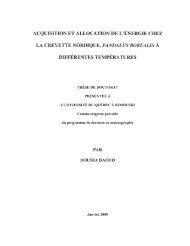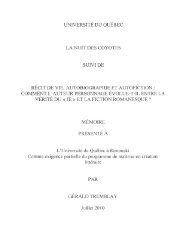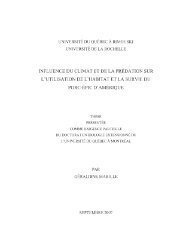effets potentiels de l'harmonie des personnalités des membres d ...
effets potentiels de l'harmonie des personnalités des membres d ...
effets potentiels de l'harmonie des personnalités des membres d ...
You also want an ePaper? Increase the reach of your titles
YUMPU automatically turns print PDFs into web optimized ePapers that Google loves.
176<br />
T he benefi ts of high conscientiousness are obvious. Conscientious individuals avoid troub le and achieve hi gh<br />
levels of SUCCeSS through purposeful planning and persistence. They are also positively regar<strong>de</strong>d by others as<br />
intelligent and reliable. On the negative si<strong>de</strong>, they can be compulsive perfectionists and workaholics .<br />
Furthermore, extremely conscientious individuals might be regar<strong>de</strong>d as stu ffy and boring. Unconscientious<br />
people may be criticized for their unreliability, lack of ambition, and failure to stay within the lines, but they<br />
will experience many short-li ved pleasures and they will never be ca lied stu ffy.<br />
Conscientiousness Facets<br />
Self-Efficacy. Self-Efficacy <strong>de</strong>scribes confi<strong>de</strong>nce in one's ability to accomplish things. High scorers believe<br />
they have the intelli gence (common sense), drive, and self-control necessary fo r achieving success. Low<br />
scorers do not feel effective, and may have a sense that they are not in control of their lives .<br />
Or<strong>de</strong>rliness. Persons with high scores on or<strong>de</strong>rliness are well-organized. They Iike to live according to<br />
routines and schedules. They keep Iists and make plans. Low scorers tend to be disorganized and scattered.<br />
Dutifulness. This scale reflects the strength of a person's sense of dut y and obligation. Those who score high<br />
on this scale have a strong sense of moral obligation. Low scorers find contracts, ru les, and regulations overly<br />
confining. They are Iikely to be seen as UIu'eIiable or even irresponsible.<br />
Achievement-Striving. Individuals who score high on this scale strive hard to achieve excellence. Their drive<br />
to be recognized as successful keeps them on track toward their lofty goals. They often have a strong sense of<br />
direc tion in Ii fe, but extremely high scores may be too single-min<strong>de</strong>d and obsessed with their wo rk. Low<br />
scorers are content to get by with a minimal amount of work, and mi ght be seen by others as lazy.<br />
Self-Discipline. Self-disc ipline-what many people ca li wi ll-power-refers to the abili ty to persist at difficult or<br />
unpleasant tasks until they are completed. Peopl e who possess high self-d iscipline are able to overcome<br />
reluctance to begin tasks and stay on track <strong>de</strong>spi te distracti ons. Those with low self-d iscipline procrastinate<br />
and show poor fo llow-through, often fa iling to complete tasks-even tasks the y want very much to complete.<br />
C autiousness. Cautiousness <strong>de</strong>scribes the di sposition to think through possibili ties before acting. High<br />
scorers on the Cautiousness scale take their time when making <strong>de</strong>cisions. Low scorers often say or do fi rst<br />
thing that cornes to mind without <strong>de</strong>liberating altematives and the probable consequences of those altematives.<br />
Neuroticism<br />
Freud originally used the term neurosis to <strong>de</strong>scribe a condition marked by mental distress, emotional suffering,<br />
and an inability to cope effectively with the normal <strong>de</strong>mands of life. He suggested that everyone shows sorne<br />
signs of neuros is, but that we di ffe r in our <strong>de</strong>gree of suffering and our specific symptoms of distress. Today<br />
neuroticism refers to the ten<strong>de</strong>ncy to experience negative feelings. Those who score high on Neuroticism may<br />
experience primaril y one specific negative feeling such as anxiety, anger, or <strong>de</strong>pression, but are li ke ly to<br />
experience several of these emoti ons. People high in neuroticism are emoti onall y reactive. They respond<br />
emotionally to events that wou Id not affect most peopl e, and their reactions tend to be more intense than<br />
normal. They are more Iikely to interpret ordinary situations as threatening, and minor fru strations as<br />
hopelessly di ffic ul t. Their negative emoti onal reactions tend to persist fo r unusuall y long periods of time,<br />
which means they are often in a bad mood. These problems in emotional regulation can diminish a neurotic's<br />
abili ty to think c1ea rl y, make <strong>de</strong>cisions, and cope effective ly with stress.



